The best way to read in the language you're learning
Translate flashcard contexts
While doing my flashcards, I sometimes notice another word I don’t understand, apart from the one on the card. Now the contexts are translatable by clicking just like full texts, and doing this will generate new flashcards for those words if they don’t already exist.
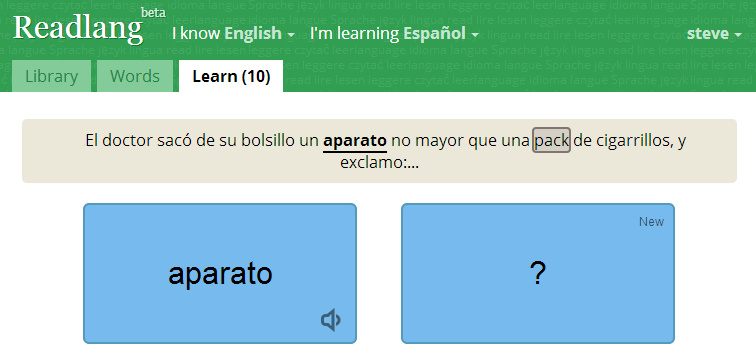
Click And Drag
Drag to Translate Phrases
People seem to like Readlang’s phrase translate feature, but having to click on each word separately was a bit tedious. Now a simple click and drag, or tap and swipe, will translate an entire phrase in one fell swoop:
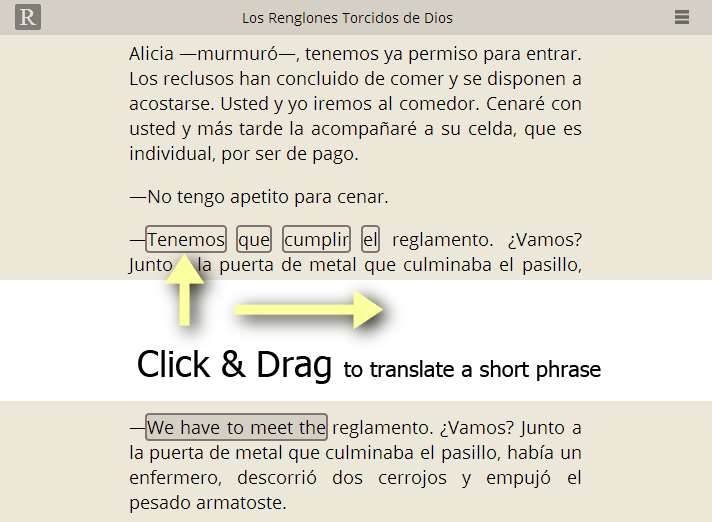
What used to be complete drag, is now a simple… well, drag. (sorry!)
Phrase Length Limits
The phrase translate feature has proved very popular. But some people have been using it translate whole sentences, which wasn’t really it’s intention, so to keep my Google Translate bill under control, I’ve limited the phrase length to 8 words maximum.
Support Readlang
Also, as people continue to sign up for the beta, I need to ensure that the site is sustainable. To this end, phrase translation will be restricted to only 10 phrases per day for all new users. Or, for only $29.99 / year or $9.99 / 3 months, you can become a Readlang Supporter, which lets you:
- Translate unlimited phrases
- Benefit from future features
- Encourage continued development of Readlang
This will allow more people into the beta test without endangering my finances. Even in it’s beta state Readlang has proven itself a very useful learning tool for myself and many others, I hope it will for you too.
Tweet CommentsEdit and Share Documents
I’m excited to tell you about two new features.
Edit Documents
You can now edit any book or article that you imported to Readlang. Just open the Sidebar and go to the Edit tab:
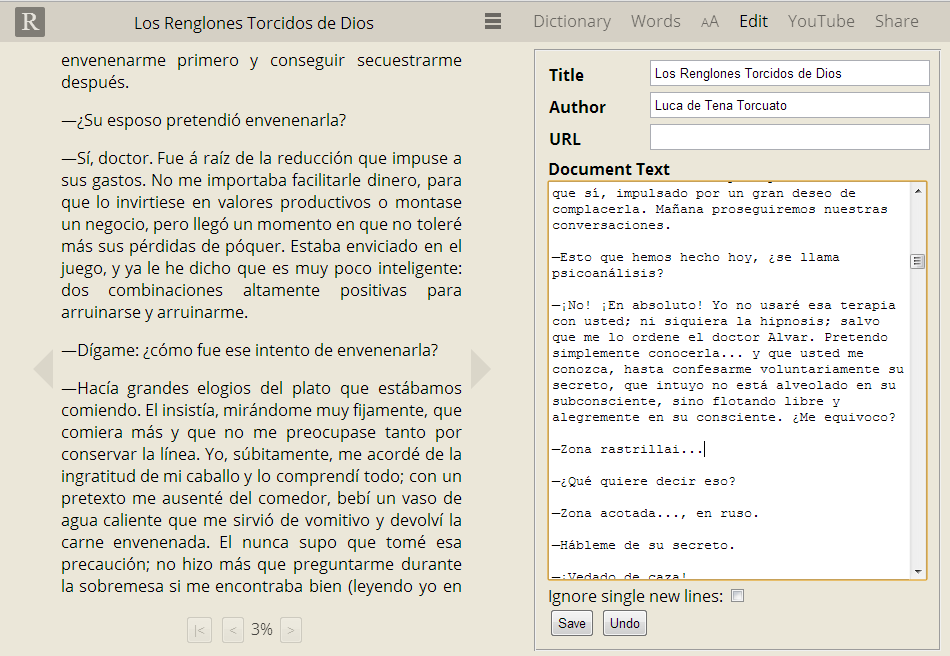
Share Documents
Why keep your perfectly edited documents to yourself? Share interesting articles with your friends or students from the Share tab in the sidebar:
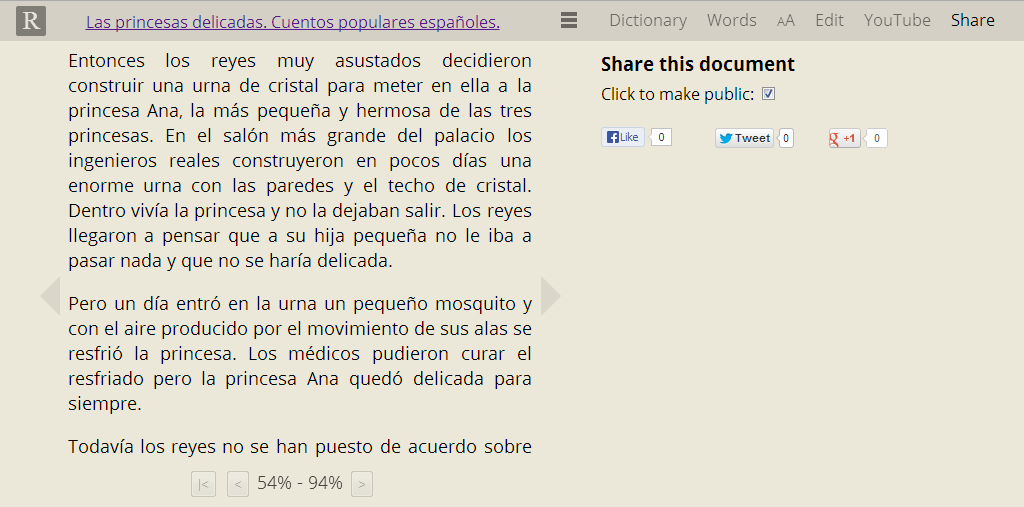
Articles shared here will appear in the Library tab for the appropriate language.
I’d like to make the public library the best place on the web to find articles and links for language learners. Here are some ideas I’m considering:
- Automatically grade each article by difficulty
- Allow users to curate lists of articles
- Allow users to discuss articles in their target language
Can you think of any features that would encourage you to share content on Readlang?
Tweet CommentsA Future Language Learning Platform
Here are a bunch of popular language learning websites:
- Anki
- LingQ
- Memrise
- Duolingo
- Readlang (OK, not as popular yet but I had to throw it in there :-)
Notice a common thread? They all re-implement their own spaced repetition system and all except for LingQ1 don’t share their data2. This means if I’ve invested time with one tool, there’s a resistence to switching to a new one. And the experience I have with a new tool will be inferior until it learns about me.
Imagine if all these tools backed onto an open learning platform which stores your progress on each word or concept. You could encounter a new word on Duolingo one day, test yourself on it with flashcards in Anki the next, then encounter the same word in an iPhone game the next day, and all these events would contribute to the same user profile. New apps would hook into this data to provide you with a personalised experience from the start. Wouldn’t that be awesome?
Of course, getting all the existing sites on board with this is a tough proposition. But if this existed and got a bit of traction, users would demand that new language learning tools or games use it.
I’m not sure exactly what it’ll look like but it should provide an open standard API to:
- Store a list of your unknown vocabulary
- Record your encounters with that vocabulary, both passive and active
- Use word frequency lists to prioritise useful words
- Use a spaced repetition to provide a stream of word to learn, along with related data like example contexts and hints
For bonus points it could incorporate grammatical rules, understand conjugation of verbs, provide good dictionary definitions, translations, etc…
I predict that one day an open platform like this will exist, and an ecosystem of connected language learning tools will emerge.
- LingQ does provide an API allowing read/write access to the words and the spaced repetition data, which is good, but doesn't seem to have attracted much of an ecosystem as far as I see. Largely due to the paywall for users.
- I suppose you could look inside Anki's local sqlite database, but if you're developing for the web, that doesn't count.
</small> (PS. As for how these ideas may affect Readlang, I’m not exactly sure yet, but stay tuned!)
Tweet CommentsHappy Half-Birthday!
Today is exactly 6 months since the first lines of Readlang’s source code were written:
commit 945599f750750ed19c37fe7337934f5e83999e8a
Author: Steve Ridout <steveridout@gmail.com>
Date: Fri Nov 30 10:56:31 2012 +0100
initial commit
And the idea to make the site was only born a couple of days before that, so it really is a half year old. I was living in Spain and frustrasted with my progress in Spanish. At the same time, I was keen to start a new programming project, and Readlang seemed a natural fit. I’d code the site by day, and in the evenings I’d test it to read books and learn Spanish, perfect!
I got a reader prototype up and running pretty quickly, and I was reading a novel with google translations within the first week. The site’s come a long way since then. I wonder what it’ll look like in another six months time…
Tweet CommentsYouTube Transcriptions
There’s a new feature on the site. It started life as plain audio to listen along with texts but got ‘upgraded’ to YouTube instead, for three reasons:
- There is a vast array of content already on YouTube.
- It has video - you can see things!
- I don’t have to store all the audio on my server, which keeps things simple for me.
I still think that plain audio would be cool to have, but this lets me get something out there that works, and get back to improving the more core aspects of the site.
You can try it out by watching the following videos in Spanish:
-
Extr@ Español 1 - A very cheesy sitcom made especially for beginners.
-
El Principito - An audio book of the beautiful classic novela.
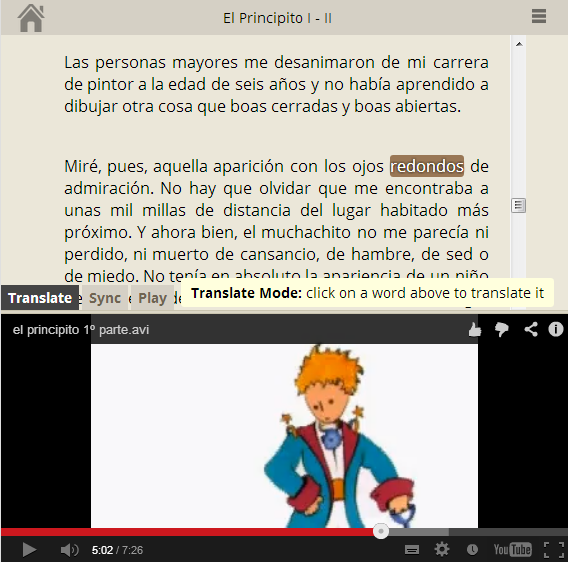
Let me know if you think this is useful, or if you think it could be improved.
Tweet CommentsThe 200th Beta Tester
Yesterday the 200th Readlang beta tester signed up. A modest number but it keeps me motivated, so thanks to all of you, especially those who are using it regularly and providing feedback!
I’m working on an audio feature now that I’m very excited about. Will share more details when it’s ready.
Tweet CommentsPhrase Translation and Anki Export
I introduced readlang on the How To Learn Any Language forum recently and have received some useful feedback. I’ve implemented two of the suggestions already.
Word Frequencies
Readlang got an awesome new feature today, it now prioritises words by their frequency.
This means I get to learn the most useful words first, which is important since I have over 500 words sitting in my queue:
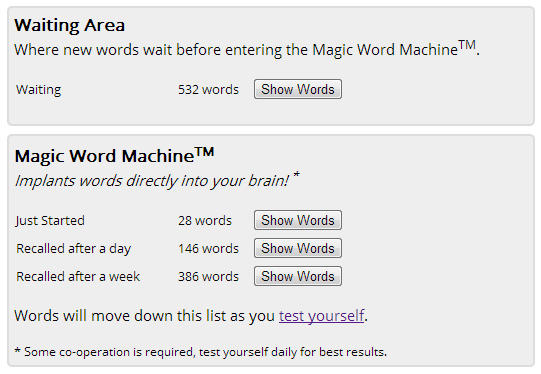
Thanks to Hermit Dave for his list of word frequencies which made this feature so simple to add to the site. The only language missing is Catalan, sorry!
Tweet CommentsVideo Tutorial
Update. The video below is out of date, here is the latest version.
I’m still busy working on the site and have made a short screencast to introduce the basic features.
Tweet CommentsParallel Texts
Parallel texts are a great learning tool for beginners. These allow you to quickly switch back and fore between the translated version and the original without breaking your flow too much. The problem is it’s almost too easy to rely on the translated version, and figuring out the matching point in the translated version sometimes takes a little searching. Aside from portability they haven’t improved much in over 2000 years.
Learn Languages By Reading
I’m a huge fan of reading to learn languages. It’s less stressful than interaction or formal studying, it gets you a lot of exposure to new words and grammar, and can be very enjoyable. How enjoyable depends on the difficulty, the content, and your tools for translating.